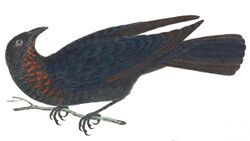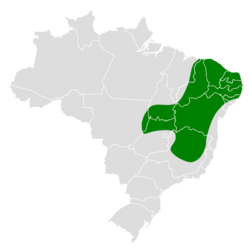Biology:Scarlet-throated tanager
| Scarlet-throated tanager | |
|---|---|

| |
| File:Scarlet-throated Tanager (Compsothraupis loricata) (W COMPSOTHRAUPIS LORICATA R1 C1).ogg | |
| Song recorded in Pernambuco, Brazil | |
| Scientific classification | |
| Domain: | Eukaryota |
| Kingdom: | Animalia |
| Phylum: | Chordata |
| Class: | Aves |
| Order: | Passeriformes |
| Family: | Thraupidae |
| Genus: | Compsothraupis Richmond, 1915 |
| Species: | C. loricata
|
| Binomial name | |
| Compsothraupis loricata (Lichtenstein, 1819)
| |

| |
| Synonyms | |
|
Tanagra loricata (protonym) | |
The scarlet-throated tanager (Compsothraupis loricata) is a small passerine bird in the tanager family Thraupidae that is endemic to eastern Brazil. It is the only member of the genus Compsothraupis.
The scarlet-throated tanager is one of the largest tanagers; 21 cm (8 1⁄4 in) in length and with a weight of 72.5g. Females are entirely black, while males have red throat. It is endemic to north-eastern Brazil, being almost entirely restricted to the region dominated by Caatinga. It is often found near water and typically at elevations of 200–1,000 m (660–3,280 ft). Typically seen in pairs or groups of up to 8 individuals. Has a habit of perching on branches high in trees. Slow-moving. In the breeding season, males fluff the feathers of the back to show off the white bases. The nest is well hidden, and typically placed deep in vegetation or in an abandoned woodpeckers hole.
Taxonomy
The scarlet-throated tanager was formally described in 1819 by the German naturalist Hinrich Lichtenstein under the binomial name Tanagra loricata.[2] Lichtenstein based his description on the Jacapú that had been described in 1648 by Georg Marcgrave.[3] The type locality is northeastern Brazil.[4] The scarlet-throated tanager is now the only member of the genus Compsothraupis that was introduced in 1915 by the American ornithologist Charles Wallace Richmond.[5][6] The genus name is formed from the Ancient Greek kompsos meaning "pretty" with thraupis, an unknown small bird. In ornithology thraupis is used to signify a tanager. The specific epithet loricata is from the Latin loricatus meaning "clothed in mail" or "breast-plated".[7] The scarlet-throated tanager is monotypic: no subspecies are recognised.[6]
References
- ↑ BirdLife International (2018). "Compsothraupis loricata". IUCN Red List of Threatened Species 2018: e.T22722153A132013027. doi:10.2305/IUCN.UK.2018-2.RLTS.T22722153A132013027.en. https://www.iucnredlist.org/species/22722153/132013027. Retrieved 12 November 2021.
- ↑ Lichtenstein, Hinrich (1819). "Die Werke von Marcgrave und Piso über die Naturgeschichte Brasiliens, erläutert aus den wieder aufgefundenen Original-Abbildungen" (in German). Abhandlungen der physikalischen Klasse der Königlich-Preussischen Akademie der Wissenschaften (1816-1817) 1816-17: 155–178 [159]. https://www.biodiversitylibrary.org/page/11078047.
- ↑ Marcgrave, Georg (1648) (in Latin). Historia Naturalis Brasiliae. Liber Quintus: Qui agit de Avibus. Lugdun and Batavorum (London and Leiden): Franciscum Hackium and Elzevirium. p. 192. https://www.biodiversitylibrary.org/page/289285.
- ↑ Paynter, Raymond A. Jr, ed (1970). Check-List of Birds of the World. 13. Cambridge, Massachusetts: Museum of Comparative Zoology. p. 253. https://www.biodiversitylibrary.org/page/14483488.
- ↑ Richmond, Charles Wallace (1915). "Notes on several preoccupied generic names (Aves)". Proceedings of the Biological Society of Washington 28: 180. https://www.biodiversitylibrary.org/page/3338639.
- ↑ 6.0 6.1 Gill, Frank; Donsker, David; Rasmussen, Pamela, eds (July 2020). "Tanagers and allies". IOC World Bird List Version 10.2. International Ornithologists' Union. https://www.worldbirdnames.org/bow/tanagers/.
- ↑ Jobling, James A. (2010). The Helm Dictionary of Scientific Bird Names. London: Christopher Helm. pp. 116, 231. ISBN 978-1-4081-2501-4.
External links
- Photos and text - arthurgrosset.com
Wikidata ☰ Q868620 entry
 |


